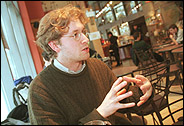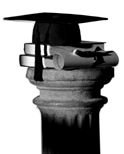kaleidoscope
Patrick Charbonneau: Chemist has all the right ingredients
 PHOTO: Owen Egan
PHOTO: Owen Egan |
|
Theoretical chemistry is a little-known discipline. Related to math and physics, the post-'50s discipline is concerned with modelling the shapes of molecules to see what will happen if pressure, temperature or other factors change.
What initially drew Patrick Charbonneau to the field, instead of to math and physics -- subjects he was equally good at -- was the fact that chemistry had a practical side.
"My aunt, who's an actuary, and my uncle, who's the technical director of a high tech company, said there were probably more jobs in chemistry so that if I didn't want to go on to the higher levels, I could probably find work in industry."
It's unlikely, however, that Charbonneau will need that security blanket. Last fall, the 22-year-old was honoured with a Lucien-Piché award, a $1,500 prize given to Quebec's top three university students in the fields of chemistry, biochemistry and life sciences who have completed 60 credits.
He was also hired last summer to work at the Center for Computational Quantum Chemistry in Georgia. His work on computer-modelling "heterocubes," a type of molecular structure, resulted in his having a paper published in Chemical Communications.
In the view of Professor Grazyna Wilczek, director of undergraduate studies in chemistry, Charbonneau is an exceptional student, not only because rare is the undergraduate who is published in a scholarly journal, but because Charbonneau is both good in the lab and good at theory -- an unusual combination of talents, she says.
Despite the demands of his field, a field he intends to continue in with a goal of becoming a university professor, Charbonneau is by no means single-minded. While fascinated by the small world of molecules and challenged by the computer programming he must develop to model such molecules, he's also in awe of the big world, both past and present. "I love to learn," he says, smoothing back his blond waves. "I'm fascinated by knowledge and not just scientific knowledge."
While studying at the CEGEP Bois de Boulogne in the Sciences, lettres et arts program, Charbonneau discovered, for instance, an appreciation for the history of art and of politics.
"I love politics. One of the best courses I took at CEGEP was in global economics," he says, explaining that following a career as an academic he can see himself moving to the "political side of science.
"There are questions of funding and how we educate scientists," says Charbonneau, who is on his department's curriculum committee and the Faculty of Science's academic committee. He's involved in the re-evaluation of the number of credits granted each course. "Many lab classes are undercredited," he notes.
Being involved in what one does is essential to Charbonneau and the people that have most influenced him fit that description. He points to Professor David Ronis. "He's very rigorous, a master of all his material, and he manages to make it interesting," says Charbonneau of the chemistry theoretician who has been both source of inspiration and guide to Charbonneau.
Artists, like Quebec singer-songwriter Richard Desjardins, who made the highly influential film l'Erreur boréale, about Quebec's abuse of its forests, also figure among Charbonneau's sources of inspiration. "He's a person who has no fear of speaking up and says what he has to say so that everyone can understand."
Charbonneau is cautious on this latter point. Keen to be a teacher, enjoying the "idea of transmitting knowledge," he wants to know his subject inside out if he's going to teach it or argue a point.
Recently, while undergoing the first of three interviews in the process of selection for the Rhodes scholars from Quebec, Charbonneau faced Julius Grey, professor of law and noted critic of Bill 101. Charbonneau was not a little intimidated but ended up thoroughly enjoying their conversation.
"We talked French literature, art, politics, art history." These are subjects dear to Charbonneau and ones he studied at CEGEP. But when the subject turned to nationalism as expressed in the painting of Monet and the music of Debussy... "Here, I had to give up," he chuckles.
Even Charbonneau, who is no stranger to music, having sung all his life, first with the renowned boys' choir Les Petits Chanteurs du Mont-Royal and now with its "graduate school," Les Chantres Musiciens, couldn't model that combination of molecules. At least not yet.
 |
||||
|
This is the first generation of youth growing up in an environment where gambling is not only legal, but endorsed and encouraged by the government. |
||||
All the presidents' diaries
 |
|
How do university presidents deal with ethical dilemmas? Probably in as many ways as there are universities.
But something that at least 15 American university presidents are using is an open diary, available to anyone with access to the Internet (www.collegevalues.org). The subjects they explore extend from banning cigarettes in residences (in the case of Tufts University), to defending the rights of a Florida State University professor to write the introduction to a book penned by a Ku Klux Klanner.
Why do these leaders open themselves up to possible attack? For some, it's to get their own values out in the open, at a time when "there's an atmosphere of suspicion about being too open about ethics," says Jon Dalton, director of Florida State University's Center for the Study of Values in College Student Development and the originator of the project.
In some cases, the diary entries are required reading for courses. At Florida State, for instance, graduate students in management have to discuss the diaries as they illustrate the difficulties of leadership.
John Keiser, president of Southwest Missouri State University, uses the diary to air his private values and those he maintains for the university. On the topic of "Sexual Preference," for instance, he writes: "My wife,..., classifies me as a conservative, macho, egotistical Catholic."
When students asked him to have sexual orientation protected under the university's non-discrimination policy, he responded by saying that it wasn't necessary, given the state laws, but that no matter what one's personal beliefs, a leader had to fight any form of discrimination.
Richard Byyny, chancellor of the University of Colorado at Boulder, wrote about being hit in the face by a pie thrown by a student protester during a speech.
"I had a bloody nose and some pain in my right cheek. The crowd was shocked into silence. I then proceeded to thank the audience and continued on with my remarks."
Source: The Boston Globe
 |
||||
|
Few finance ministers in Canadian history, or in any other country's history, would have had his understanding of economics. |
||||
Choosy students
There once was a time when newly minted university graduates would jump at a job offer, any job offer, in order to start their career path and pay off their student debts.
Not any more.
According to a recent poll of over 3,000 Canadian university students, today's impending graduates are a choosier lot. Even a generous starting salary won't entice them to join your organization unless you have other goodies to offer as well -- like challenging responsibilities and flexible workplaces.
"Money isn't enough to attract today's students to companies," says John Wright, senior vice-president of Ipsos-Reid, the firm that did the poll.
Mind you, students are expecting pretty good salaries right from the start: $46,145 for undergraduates, $57,301 for graduate students. By 2005, those salaries are expected to rise to $68,084 and $81,052 respectively.
Students have a lot of bargaining leverage today as they often have the high-tech skills that companies are clamouring for. They're also entering the job market just as a wave of baby boomers retire.
"Six out of 10 CEOs say that it is getting harder and harder to find right-skilled people to fill needed positions," Wright says.
The poll indicates that 67 per cent of students would accept a so-so salary if they could earn sizeable bonuses for exceptional work. Fifty-seven per cent would take a pay cut in order to enjoy flexible work hours.
Three out of five students expect to change jobs at least three times in their careers. More than half would welcome the opportunity to work outside of Canada temporarily. And 16 per cent believe they are destined to become millionaires.

